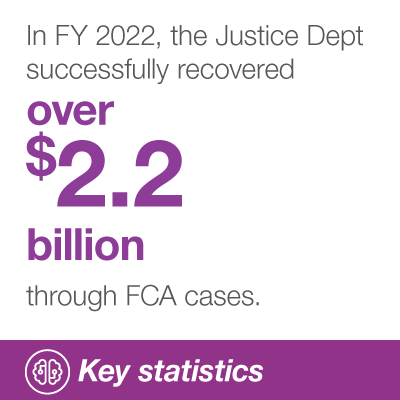Read time: 3 minutes
In 2022, “[t]he government and whistleblowers were party to 351 settlements and judgments, the second highest number of settlements and judgments in a single year.” Notably, “health care fraud remained the leading source of False Claims Act settlements and judgments[.]” Insurers should be aware that an effort is underway in Congress to further boost FCA enforcement. The False Claims Amendments Act of 2023 (FCAA) would amend the FCA’s “materiality” requirement in a way that could pose challenges for managed care organizations.
Background
The FCA prohibits, in part, a misrepresentation of compliance with a statutory, regulatory or contractual requirement that is material to the government’s payment decision. See Universal Health Servs. v. United States ex rel. Escobar, 579 U.S. 176, 192 (2016). The FCA defines “material” as “having a natural tendency to influence, or be capable of influencing, the payment or receipt of money or property.” See 31 U.S.C. § 3729(b)(2)(4). The Supreme Court’s 2016 landmark decision in Escobar emphasized a “rigorous” approach to materiality because the FCA should not serve as a catchall anti-fraud statute or penalize minor breaches of contractual or regulatory provisions. The Court articulated several factors to determine materiality, including whether the government explicitly designated the requirement in question as a condition of payment; whether the violation was minor or substantial; and (relevant here) whether the government continued to pay or did so in the “mine run” of cases despite knowledge of the violation.
 Post-Escobar, courts have grappled with application of this last factor. Many courts, relying on Escobar’s statement that continued government payment is “very strong evidence” of non-materiality, assign great weight to the government’s decision to pay a claim despite knowing of the alleged falsity. There, courts have dismissed FCA claims for want of materiality. See Gharibian ex rel. United States v. Valley Campus Pharmacy, Inc., No. 21-56253, 2023 U.S. App. LEXIS 1009, at *5 (9th Cir. Jan. 17, 2023) (upholding dismissal of complaint where there were no allegations that payment would have been withheld based on knowledge of falsity). Other courts, however, view the government’s decision to pay a claim while being aware of the alleged falsity as only one non-dispositive factor among many. See United States v. Anthem Inc., No. 20-cv-2593 (ALC), 2022 U.S. Dist. LEXIS 180298, at *12 (S.D.N.Y. Sep. 30, 2022) (finding materiality despite no refusal to pay because refusal to pay “is materiality’s ceiling, not its floor”).
Post-Escobar, courts have grappled with application of this last factor. Many courts, relying on Escobar’s statement that continued government payment is “very strong evidence” of non-materiality, assign great weight to the government’s decision to pay a claim despite knowing of the alleged falsity. There, courts have dismissed FCA claims for want of materiality. See Gharibian ex rel. United States v. Valley Campus Pharmacy, Inc., No. 21-56253, 2023 U.S. App. LEXIS 1009, at *5 (9th Cir. Jan. 17, 2023) (upholding dismissal of complaint where there were no allegations that payment would have been withheld based on knowledge of falsity). Other courts, however, view the government’s decision to pay a claim while being aware of the alleged falsity as only one non-dispositive factor among many. See United States v. Anthem Inc., No. 20-cv-2593 (ALC), 2022 U.S. Dist. LEXIS 180298, at *12 (S.D.N.Y. Sep. 30, 2022) (finding materiality despite no refusal to pay because refusal to pay “is materiality’s ceiling, not its floor”).
Proposed FCAA
The FCAA, introduced by a bipartisan group of senators, seeks to address what they see as a loophole Escobar created. Namely, the proposed legislation will remove the argument that continued government payment provides “very strong evidence” regarding the lack of materiality. Accordingly, the proposed legislation states that continued government payment despite knowledge of falsity “shall not be considered dispositive if other reasons exist for the decision of the Government[.]” Its focus is to clarify that the mere continuation of government payments should not shield a company from FCA liability.
- FCA settlements and judgments, primarily in health care, are at near-record levels
- Post Escobar, bipartisan group of senators has introduced bill that would amend FCA’s materiality requirement, stating government’s decision to continue paying claims despite knowledge of fraud is not dispositive if “other reasons” exist for continued payment
- Enactment of proposed legislation could increase FCA enforcement, heighten discovery disputes and prolong litigation, particularly in health care matters

